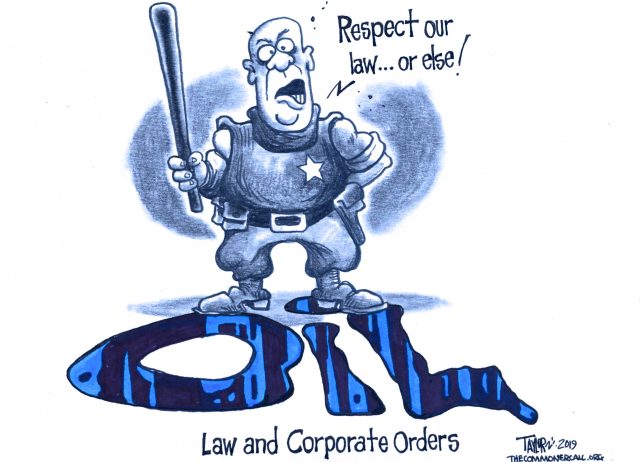
Is it “criminal” for an industry to drive the global climate crisis in order to reap profits? Or is it “criminal” to (literally) get in the way?
By Sarah Lazare & Simon Davis-Cohen
In These Times (4/16/19)
Researchers concluded in January that humanity has a hope, a 64 percent chance, of keeping the temperature rise below the international target of 1.5 degrees Celsius—if the phaseout of fossil fuel infrastructure begins now and every car, plane and power plant in existence gets replaced by a zero-carbon alternative at the end of its life span.
“We are basically saying we can’t build anything now that emits fossil fuels,” said Christopher Smith of the University of Leeds, the lead researcher.
Meanwhile, the multi-trillion-dollar fossil fuel industry is in the midst of an enormous infrastructure expansion. A 2018 industry report projected that $791 billion in oil and gas pipelines would be constructed in North America between 2018 and 2035.
Already, activists are countering industry influence by blocking pipeline construction, shutting down refineries, mobilizing coal towns against mountaintop removal mining and intervening in global climate talks. But the fossil fuel industry has the advantage of a national politics and a law enforcement apparatus that protect the interests of capital over those of the public.
In 2017, with the support of the American Petroleum Institute, 84 Congress members, including four Democrats, sent a letter urging the attorney general to charge anti-pipeline protesters with terrorism under the Patriot Act.
As Dallas Goldtooth, a “keep it in the ground” campaigner for the Indigenous Environmental Network, puts it: “The oil industry and state collude to keep the status quo.”
The companies that produce fossil fuels and those that burn them, such as automakers and utility companies, spent $2 billion between 2000 and 2016 to influence climate legislation in the United States, outspending environmental groupsand renewable energy lobbyists 10 to 1. The Trump administration has since offered industry “unprecedented access,” according to oil executives themselves in a gleeful 2017 meeting of the Independent Petroleum Association of America, a tape of which was obtained by The Center for Investigative Reporting. A 2018 study found that the Environmental Protection Agency is now at its most pro-business, anti-regulatory point in its nearly 50-year history.
Globally, fossil fuel companies have spread their influence throughout UN climate talks, successfully pushing neoliberal reforms like emissions trading schemes and carbon offsets—measures that give lip service to climate action while encouraging the use of fossil fuels.
Capturing ‘big green’ groups
To neutralize its opposition, the fossil fuel industry has sought to capture the “big green” leading environmental advocacy groups. BP has donated millions to the Nature Conservancy and shared a board member with the World Wildlife Federation (WWF) until 2014. Efforts to get the big greens to distance themselves from fossil fuel companies have seen some success, and many now refuse direct donations (including the WWF), but some partnerships persist: The Environmental Defense Fund (EDF) and the Nature Conservancy continue to work with BP and Shell, respectively, and the EDF still calls natural gas “an important fuel source.”
When the carrot doesn’t work, the energy industry is happy to use the stick. …
(Commoner Call cartoon by Mark L. Taylor, 2019. Open source and free for non-derivative use with link to ewww.thecommonercall.org )

